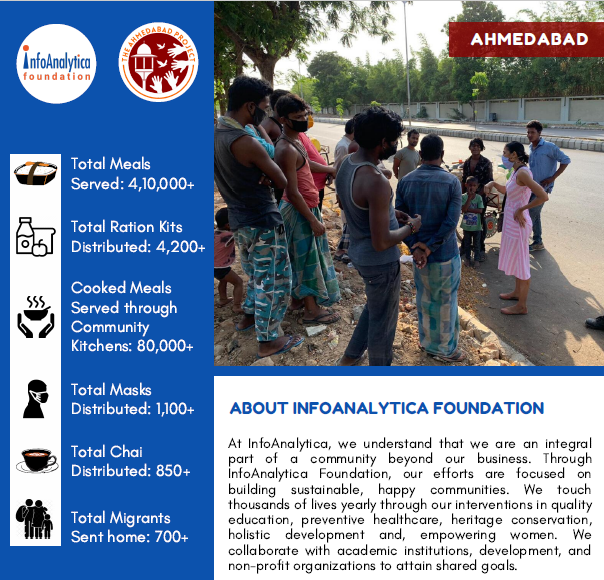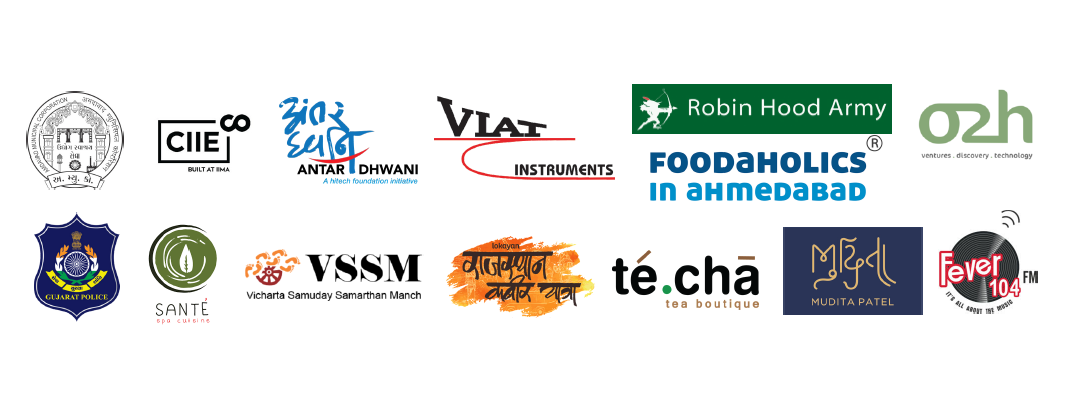The Imprints l CSR Newsletter
June 25th, 2020

Editor’s Note
Welcome to the COVID 19 edition of 'The Imprints,' our CSR newsletter designed especially for iA employees, our partners, and affiliates. This edition of ‘The Imprints’ would speak about the initiatives which we have undertaken during the pandemic lockdown for the society, collaborations with various stakeholders, NGOs and corporates and our Founder’s message.
We will also highlight the contributions of our employees and affiliates, who are volunteering and contributing to our initiatives in building equitable and sustainable communities.
I want to thank Amit Gupta, Founder – infoAnalytica, and everyone from the team for their everlasting support throughout our activities and initiatives, and in everything that we do!
- Pranav Gupta, Project Manager - CSR
In this issue:
- Founder’s Message
- Initiatives under COVID 19 Lockdown
- STATS
- Areas Covered
- Collaborations
ABOUT INFOANALYTICA FOUNDATION
At InfoAnalytica, we understand that we are an integral part of a community beyond our business. Through InfoAnalytica Foundation, our efforts are focused on building sustainable, happy communities. We touch thousands of lives yearly through our interventions in quality education, preventive healthcare, heritage conservation, holistic development and, empowering women. We collaborate with academic institutions, development, and non-profit organizations to attain shared goals.
ABOUT THE AHMEDABAD PROJECT
The Ahmedabad Project aims to create equitable and empathetic cities across India. As India urbanizes rapidly, cities are expanding but without considering the massive influx of migrants from villages who come to the city for earning a livelihood. Cities are also facing challenges of traffic, garbage disposal, water shortages, and disappearance of the city's green cover. The Ahmedabad Project works through policy engagement with citizens, workshops on governance, policy cafes and fellowships on civic issues. We think our cities will be more livable when enough citizens understand who their ward councilors are, what their corporation does, and how to evaluate and make better policies.
OUR RESPONSE TO COVID 19
When COVID - 19 lockdown was announced, we were in the middle of launching a few initiatives on working with the informal sector. These centered around finding ways to create social safety nets like pensions, insurance, and maternity leaves for those working as housemaids, construction workers, cooks, nannies, drivers, security guards, and others. However, we realized that the immediate need during lockdown was of food and rations.
SHORT TERM INTERVENTIONS

RATION KIT DISTRIBUTION
We wanted to give rations to those who could cook and food packets to those who couldn’t like the homeless. One kit typically contains (Aata - 3 kgs, Rice - 2 kgs, Dal - 1 litre, Oil - 1 litre, Tea - 100 gms, Sugar - 1 kg, Haldi - 100 gms, Jeera - 100 gms, Mirchi - 100 gms and Salt - 500 gms) which can sustain a family of 4 for atleast 10 days. We have given 4,200+ kits so far.

COMMUNITY KITCHENS AND COOKED MEALS
We supported eight community kitchens in Ahmedabad and one in Bikaner (Rajasthan) serving meals to more than 6,000+ people daily. We also collaborated with a restaurant in Ahmedabad - Sante Spa Cuisine, to prepare cooked meals which were served by Robinhood Army.

AHMEDABAD RUNS ON CHAI
We say our cities run on chai. This project was our small homage to those coronawarriors who were out there working for our city during the lockdown traffic cops, street vendors selling vegetables and safai karamcharis. Wherever our volunteers found them, we served chai made with Te-cha’s collaboration.

MASKS AND PPE KITS DISTRIBUTION
As the city wears a deserted look, With the help of Mudita Patel Designs, we helped the Ahmedabad Police with face masks. More than 1,100+ face masks were distributed to traffic police, security guards and the ones in need. For emergencies, we also supplied a few PPE kits to needy hospitals.

SENDING MIGRANTS BACK HOME (PROJECT लौटचल)
Home is important, we should be thankful for the luxury we enjoy when we make a cup of tea or have a room of our own to relax in. We helped migrants from UP, West Bengal, Bihar, Jharkhand, and Nepal to go back home in coordination with Indian Railways and private bus companies. We paid their train and bus fares and gave them a small token of cash for any needs during the journey or immediately after.
LONG TERM INTERVENTIONS

THE CREATIVE FELLOWSHIP
The Creative Fellowship was an effort to bring the artistic community together to sensitize citizens towards the plight of the poor in India. A team of 30 designers from across the country (From NID, CEPT, NIFT, SRISTI, Anant Fellowship, and so on) got together to create content related to dignity in the informal sector. Posters, videos, graffiti, and social media content, were designed on construction workers, maids, safai workers, guards, and their daily struggles. For example, a poster showing how we enjoy at least 150 days of holidays yearly (104 days of weekends off + medical + casual + festival leaves) and domestic maids get none and so on.
DIGITAL DOST (COLLATING AND DIGITIZING DATABASE OF MIGRANTS)
Digital Dost aims to document unorganized sector migrants specifically in urban areas working across manufacturing, construction work, rag-picking, maids, drivers, guards, and other informal professions. The data with the state isn’t actionable, or the data is scattered among different non-profits with no coordination or there isn’t enough data. Digital Dost is an actionable, dynamic database that will help us transfer funds, run upskilling initiatives and get insurance and pension products to migrant workers.

HOMEMAKERS’ ALLIANCE
No federation or union of domestic maids exists in Gujarat. We want to register them, unite them and push for a national legislation on recognizing housework.

REFORMING CESS ACT
We are looking at changing the existing Building and Construction Workers’ Cess Act to make it easier for builders to treat labourers as employees than having the government run a separate welfare board.

THE MAZDOOR CAMPAIGN
No federation or union of domestic maids exists in Gujarat. We want to register them, unite them and push for a national legislation on recognizing housework.
Total Meals Served: 4,10,000+
Total Ration Kits Distributed: 4,200+
Cooked Meals Served through Community Kitchens: 80,000+
COLLABORATIONS
